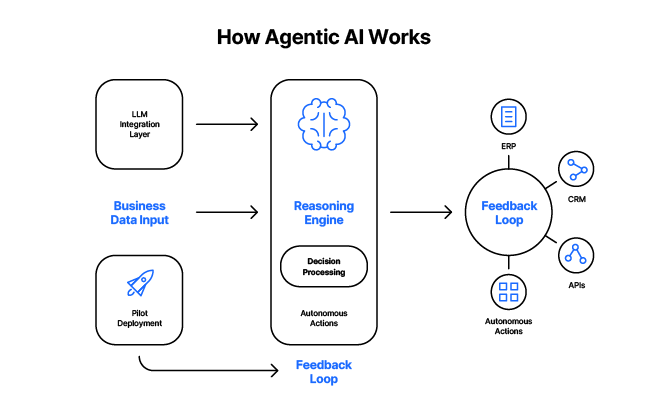What is Agentic AI?

Overview
Agentic AI is a new type of artificial intelligence that can act on its own, make autonomous decisions, and work toward complex, long-term goals with very little human help. Think of it as a highly capable, digital employee you can assign a major objective to, and it will figure out the steps, execute the plan, and adapt as needed to get the job done.

This kind of AI is goal-oriented. Instead of just answering a single question (like traditional AI) or creating content based on a prompt (like generative AI), agentic AI maintains its objective over time and independently determines the best way to achieve it through multi-step execution and dynamic strategy changes.
Agentic AI is transforming how businesses approach automation, decision-making, and problem-solving. By delegating complex, multi-step processes to AI agents, organizations and government agencies can focus on strategic initiatives, innovation, and customer relationships while achieving unprecedented operational efficiency.
Key takeaway: Think of agentic AI as a highly capable digital employee. Unlike traditional AI that requires step-by-step instructions, agentic AI can be assigned a goal and will independently plan, execute, and adapt its approach to achieve it.
Agentic AI
Agentic AI vs other types of AI
Understanding the distinctions between agentic AI and other artificial intelligence approaches is essential for enterprises evaluating AI implementation strategies. While traditional AI systems require explicit programming for each task and generative AI focuses on content creation, agentic AI operates with autonomous goal-seeking behavior that can adapt strategies and execute complex business processes independently.
The fundamental difference lies in operational autonomy and goal persistence. Traditional AI systems execute predefined tasks with human oversight at each step, generative AI creates content based on prompts, and agentic AI maintains objectives over time while independently determining how to achieve them through dynamic strategy adjustment and multi-step execution.
How does agentic AI differ from traditional AI automation?
Traditional AI automation operates through rule-based systems and predefined workflows that execute specific tasks when triggered by predetermined conditions. These systems require extensive programming for each scenario and cannot adapt to unexpected situations without human intervention or additional coding. Enterprise implementations typically involve robotic process automation tools that follow exact sequences of actions across business applications.
Agentic AI differs fundamentally by maintaining persistent goals and adapting its approach based on environmental feedback and changing conditions. Rather than following predetermined scripts, agentic AI systems evaluate multiple strategies, learn from outcomes, and modify their behavior to achieve specified objectives more effectively. This autonomous adaptation capability enables enterprises to deploy AI systems that can handle complex, unpredictable business scenarios without constant reprogramming or human oversight.
What distinguishes agentic AI from generative AI systems?
Generative AI systems like large language models focus on content creation and response generation based on input prompts, producing text, images, or other media based on patterns learned from training data. These systems excel at creating content but require human users to provide context, direction, and evaluation of outputs for each interaction. Enterprise applications typically involve content generation, document drafting, and creative support tasks.
Agentic AI incorporates generative capabilities while adding goal-oriented behavior and autonomous execution capabilities.
While generative AI responds to immediate prompts, agentic AI maintains objectives across multiple interactions and can independently plan and execute multi-step processes to achieve specified goals. This distinction enables enterprises to deploy agentic AI for complex business processes that require sustained focus and adaptive strategy execution rather than simple content generation tasks.
How does agentic AI compare to machine learning systems?
Machine learning systems analyze data to identify patterns, make predictions, or classify information based on training datasets, but they typically require human operators to interpret results and decide on appropriate actions. These systems excel at data analysis and pattern recognition but depend on human judgment for translating insights into business decisions and actions.
Agentic AI builds upon machine learning foundations while adding autonomous decision-making and action execution capabilities. Rather than simply providing predictions or classifications, agentic AI systems can interpret analytical results, evaluate potential actions, and execute strategies to achieve business objectives.
This integration enables enterprises to deploy end-to-end automated processes that combine data analysis with strategic execution without requiring human intervention at each decision point.
AI technology comparison
| Capability | Traditional AI | Generative AI | Machine Learning | Agentic AI |
|---|---|---|---|---|
| Autonomy level | Rule-based execution | Prompt-responsive | Pattern analysis | Goal-driven autonomy |
| Goal persistence | Task-specific | Single interaction | Analysis-focused | Long-term objectives |
| Adaptation capability | Requires reprogramming | Limited to training data | Pattern-based insights | Dynamic strategy adjustment |
| Decision-making | Predefined logic | Content generation | Predictive outputs | Autonomous choices |
| Learning approach | Static rules | Pre-trained models | Historical data patterns | Continuous operational learning |
| Business application | Process automation | Content creation | Data analysis | End-to-end process management |
| Human oversight | Step-by-step guidance | Output evaluation | Result interpretation | Strategic objective setting |
| Problem-solving scope | Defined scenarios | Creative tasks | Data-driven insights | Complex multi-step challenges |
Quick comparison:
When to use Agentic AI: Choose agentic AI when business processes require sustained autonomous operation across multiple systems without continuous human oversight, especially for complex decision-making sequences that must adapt to changing conditions
When to use alternatives:
Traditional AI: Standardized, repetitive tasks
Generative AI: Content creation
Machine learning: Data analysis and predictions
When should enterprises choose agentic AI over other approaches?
Enterprises should consider agentic AI when business processes require sustained autonomous operation across multiple systems and decision points without continuous human oversight. Traditional AI automation works well for standardized, repetitive tasks with predictable inputs and outputs, while agentic AI excels in dynamic environments where strategies must adapt based on changing conditions and evolving objectives.
Agentic AI becomes particularly valuable when business processes involve complex decision-making sequences that require coordination across multiple systems, departments, or time periods. Unlike generative AI that focuses on discrete tasks or machine learning typically applied to specific analytical insights, agentic AI can manage entire business workflows from initiation to completion while adapting strategies based on intermediate results and environmental changes. This capability makes agentic AI most suitable for enterprise applications requiring autonomous process management, strategic execution, and adaptive problem-solving in complex operational environments.
What are the key characteristics of agentic AI?
- Goal-oriented: Agentic AI systems are designed with specific objectives in mind. These goals can range from simple tasks, like scheduling meetings or sorting emails, to more complex objectives, such as optimizing supply chains or managing financial portfolios. The AI agent continuously monitors its environment and takes actions to achieve its designated goals.
- Autonomous decision-making: Agentic AI can make decisions without human intervention. This autonomy is based on its understanding of the environment, its assigned goals, and its learned experiences. The AI agent can analyze data, assess risks, and choose the best course of action to achieve its objectives.
- Adaptive learning: Agentic AI systems may learn from their interactions and improve their performance over time. As they encounter new situations and receive feedback, they refine their decision-making processes and become more adept at achieving their goals. This ability to learn and adapt is critical for operating in dynamic and unpredictable environments. Learning may involve human feedback (“human-in-the-loop”) coming from individual users or managers watching behavior over time, or automated feedback to deal with identified exceptions.
How OpenText enables enterprise agentic AI success
OpenText has spent over 35 years building digital platforms for knowledge workers, and today we're pioneering the next evolution: creating digital knowledge workers through agentic AI.
Our approach transforms how enterprises harness artificial intelligence by addressing the foundational challenges that limit AI success—data integration, security, and scalability.
While many companies struggle to implement AI effectively due to fragmented data and security concerns, OpenText provides the essential foundation that makes agentic AI truly powerful for enterprise environments:
Unified data cloud foundation
Agentic AI requires access to complete, accurate, and real-time information to make autonomous decisions. OpenText's data cloud approach eliminates the data silos that plague enterprise AI initiatives by:
- Centralizing information from disparate enterprise systems into a single source of truth.
- Ensuring data quality, governance, and compliance across all AI applications.
- Providing agentic AI systems with dynamic, live information for real-time decision-making and workflow optimization.
Enterprise-grade security for AI confidence
Security concerns remain the top barrier to AI adoption, with 44% of IT leaders citing security and compliance risk as their primary information management challenge. OpenText addresses this through:
- AI-enhanced threat detection: OpenText™ Cybersecurity Aviator™ automatically learns and deploys new threat detection models within hours.
- Secure AI implementation: Robust access controls, data classification, and compliance management that let you deploy agentic AI with confidence.
- AI security protection: Defend against AI-driven attacks while enabling AI-powered security capabilities.
What are OpenText's agentic AI solutions?
OpenText delivers agentic AI through specialized solutions that integrate seamlessly with your existing enterprise infrastructure:
Cybersecurity Aviator enhances your threat detection and response through:
- Autonomous learning and deployment of new threat detection models within hours.
- Real-time analysis of network behavior to identify anomalous activities.
- Automated response to emerging security threats and vulnerabilities.
OpenText™ Content Aviator™ transforms how employees interact with business information through:
- Conversational search and content discovery across enterprise repositories.
- Automated summarization and translation of complex documents.
- Intelligent content classification and workflow automation.
OpenText™ Content Aviator™ optimizes your software delivery lifecycles by:
- Predicting software delivery times and identifying risks with built-in flow intelligence.
- Generating and automating tests from scripts, videos, and backlog items.
- Recommending and executing fix strategies to keep delivery on track.
OpenText™ Experience Aviator™ deploys agentic AI agents that:
- Auto-generate contextual and relevant content for customer communications, rich media, and images.
- Analyze customer data to autonomously resolve account issues.
- Adjust subscription plans and billing based on user preferences and history.
- Reduce reliance on human agents while improving response times.
OpenText™ Service Management Aviator™ uses AI assistants to transform IT service delivery through:
- AI-enriched workflows that deploy agentic AI agents capable of interacting with each other.
- Autonomous case summarization and solution suggestions for service desk agents.
- Self-service capabilities that empower users to resolve common IT and non-IT requests.
- Intelligent knowledge retrieval from enterprise repositories, HR systems, and third-party support platforms.
- Private LLM with retrieval augmented generation (RAG) that maintains data security and reduces hallucinations.
OpenText™ Business Network Aviator™ simplifies B2B and supply chain integration with an AI self-service advisor by providing:
- Instant, accurate answers in plain language to use OpenText™ Trading Grid™ more efficiently as part of your supply chain operations.
- Deeper supply chain insights linked to your business data by finding and sharing contextual responses based on your B2B and EDI inquiries.
- Simplified EDI payload and transaction analysis shared in business-ready language that works for everyone in your organization regardless of technical expertise.
- Faster resolution times by offering clear, actionable guidance on complex error codes and the ability to create a support ticket while in the app.
- Efficient IoT operations through unified asset identity, closed-loop anomaly detection, using generative AI and large language models (LLMs) that provide the trusted data foundation agentic AI requires.
How can enterprises get started with OpenText agentic AI?
OpenText's vision extends beyond individual AI tools to creating comprehensive digital teammates that amplify human capability. Our Aviator AI solutions:
Boost productivity through smart automation
According to Foundry Research, improved productivity is the most sought-after benefit of AI, with 78% of mature AI users strongly attributing productivity gains to modern AI technologies. OpenText's agentic AI delivers this productivity boost by:
- Automating repetitive workflows to free employees for strategic thinking and innovation.
- Ensuring build agents have the right access to data and AI engines to control costs securely.
- Handling multi-step business processes without human intervention while learning and improving over time.
Empower your workforce
Greater productivity through agentic AI means more than just faster task completion—it transforms how your employees work, enabling them to:
- Redirect focus to high-value activities: Free your teams from routine tasks to engage in creative problem-solving, strategic planning, and innovation.
- Enhance job satisfaction: Employees report higher morale when AI handles mundane work, allowing them to focus on meaningful contributions.
- Foster collaboration: With time previously spent on repetitive tasks, teams can build stronger client relationships and pursue professional development.
Integrate across enterprise systems
According to recent research, 52% of organizations prioritize integration capabilities when selecting AI partners. OpenText delivers:
- Seamless connections between AI agents and existing enterprise applications.
- API-driven architecture that supports custom integrations.
- Workflow automation that spans multiple business systems.
Provide measurable business impact
Organizations with mature AI implementations using OpenText solutions report:
- Enhanced operational efficiency through automated routine tasks.
- Improved decision-making speed and accuracy.
- Significant productivity gains across knowledge worker roles.
Getting started with OpenText agentic AI
Our approach to implementing agentic AI focuses on building a strong foundation before deploying autonomous systems:
- Information assessment: Evaluate and optimize your data landscape for AI readiness.
- Security positioning: Implement AI-ready security and governance frameworks.
- Pilot implementation: Deploy agentic AI in targeted use cases with measurable outcomes.
- Scale and optimize: Expand successful implementations across the enterprise.
The future is limitless
At OpenText, we believe technology should always elevate human potential. Our agentic AI solutions don't replace your workforce—they create digital teammates that handle routine tasks, surface critical insights, and enable your teams to focus on creativity, strategy, and innovation.
When your information is unified, secure, and accessible through OpenText's platform, agentic AI becomes a transformative force that removes barriers and unlocks your organization's limitless potential.
Ready to explore how OpenText can deliver agentic AI for your enterprise?
Contact our team to discuss your specific use cases and implementation strategy.
Ready to try Aviator? Get access to OpenText MyAviator today!
Practical Agentic AI Examples and Use Cases
Agentic AI’s ability to plan and execute complex, sustained processes makes it valuable across many business functions and industries.
Content and document management use cases
Agentic AI is a game-changer for handling large volumes of unstructured data like documents, spreadsheets, and rich media.
- Document analysis and auto-redaction: An agent can be given the goal-oriented task to "process all new customer contracts."
- It will analyze the contract (a document), perform personally identifiable information (PII) detection within it, and then execute auto-redaction of sensitive data to ensure compliance before sending the document to the next secure repository.
- Rich media processing: The agent can work with video and audio files:
- Transcription: An agent processes an audio recording of a board meeting.
- Speaker recognition: It identifies and labels which executive said what.
- Facial recognition (in video footage): It can identify key stakeholders for indexing purposes.
- Based on a strategic objective, it can then perform an autonomous decision to categorize the recording and file it in the appropriate, long-term knowledge repository based on the content's topic and participants.
- Computer-aided design (CAD) drawings and engineering: An agent can be set to the objective of "validate all updated component designs against quality standards." It would access the CAD drawings, analyze the specifications, flag any deviations, and update the associated part numbers in the enterprise resource planning (ERP) system—a multi-step, adaptive process.
Industry-specific use cases
- Financial services: Agentic AI can automate complex investment decisions, manage financial portfolios, and autonomously detect fraudulent transactions by constantly monitoring, learning, and adapting to new patterns.
- Insurance: Agents can manage the entire claims process, from analyzing initial documents to assessing risk and making autonomous decisions on claim payouts within defined parameters, while flagging any anomalies for human review.
- Government: Agents can manage complex regulatory compliance by continuously monitoring changes in law, assessing the impact on various internal systems, and autonomously initiating corrective processes across multiple departments to maintain compliance.
- Logistics (supply chain): Agentic AI optimizes production schedules and manages inventory. For instance, an agent with the goal to "maximize on-time delivery" can monitor weather, traffic, and inventory levels in real-time and make autonomous decisions to reroute shipments or adjust supplier orders to prevent delays. This is an example of adaptive learning applied to a complex, multi-variable environment.
How agentic AI works?
Agentic AI systems operate through a layered architecture that integrates multiple artificial intelligence technologies to enable autonomous decision-making and goal achievement in enterprise environments.
These systems fundamentally differ from traditional business automation by maintaining persistent objectives, adapting strategies based on operational feedback, and executing complex multi-step processes without continuous oversight.
Technical architecture
The technical foundation combines:
- Perception mechanisms to understand business environments
- Reasoning engines to process information and make decisions
- Memory systems to retain organizational knowledge
- Action frameworks to execute plans across enterprise systems
This architecture enables autonomous operation while maintaining alignment with business objectives and compliance requirements.

What enables autonomous decision-making for business operations?
Autonomous decision-making in enterprise agentic AI emerges from reasoning engines that evaluate multiple business scenarios and select optimal strategies based on current conditions and organizational goals. These systems assess the probability of success for different approaches, weigh operational risks and benefits, and choose actions that maximize business value. Unlike rule-based automation that follows predetermined workflows, agentic AI can generate novel solutions to unfamiliar business challenges by combining learned patterns with logical reasoning.
The decision-making process incorporates multiple business criteria simultaneously, including immediate operational requirements, strategic objectives, resource constraints, and regulatory compliance. This capability allows enterprise agentic AI to operate effectively in dynamic business environments where conditions change rapidly and perfect information is rarely available.
How do agentic AI systems learn and adapt to enterprise needs?
Enterprise agentic AI employs memory architectures that enable both immediate task management and long-term organizational learning. Working memory maintains context about current business processes, operational conditions, and active objectives, allowing the system to track progress and adjust strategies in real-time across multiple enterprise applications.
Long-term memory systems accumulate organizational knowledge and operational experiences that inform future business decisions. These systems record specific interactions, outcomes, and contextual information from past business processes, creating a repository of institutional knowledge that improves performance over time. This organizational learning capability enables agentic AI to become more effective as it gains experience with specific business environments and operational patterns.
What role do large language models (LLMs) play in enterprise agentic AI?
LLMs serve as the primary interface between business managers or business analysts defining agents and the tasks, routing, and mechanics that access data and control actions within the system. These models allow agentic AI to interpret executive instructions, understand business documentation, apply chain-of-thought reasoning, and generate appropriate responses or action plans based on organizational context.
LLMs contribute reasoning capabilities that enable enterprise agentic AI to analyze business problems, generate strategic plans, and evaluate potential solutions across different business domains. This combination of language understanding and business reasoning makes LLMs particularly valuable for applications where agentic AI must interact with stakeholders and process diverse types of business information.
How do agentic AI systems integrate with enterprise infrastructure?
Enterprise agentic AI integration relies on API connections and data pipeline architectures that enable seamless interaction with existing business systems. These systems connect to enterprise resource planning platforms, customer relationship management systems, and other critical business applications through standardized interfaces that maintain data security and operational integrity.
Multiple specialized agents often coordinate within enterprise environments, with each agent focused on specific business functions while sharing information through secure communication protocols. This distributed approach enables complex business process automation that spans multiple departments and systems while maintaining centralized oversight and control over business operations.
How does agentic AI benefit businesses?
Understanding what makes agentic AI different
Agentic AI is a new type of artificial intelligence that can act independently, make autonomous decisions, and work toward complex, long-term goals with minimal human intervention. Think of it as a highly capable digital employee you can assign a major objective to—it will figure out the steps, execute the plan, and adapt as needed to get the job done.
What sets agentic AI apart are three core capabilities:
- Autonomous decisions: The AI acts independently without requiring approval at every step.
- Goal-oriented: It maintains objectives over time through multi-step execution, rather than just responding to single prompts.
- Adaptive learning: It analyzes outcomes, evaluates strategies, and modifies its behavior to achieve objectives more effectively.
Agentic AI offers a wide range of benefits for businesses across various industries:
- Increased efficiency and productivity: By automating repetitive tasks and optimizing workflows, agentic AI can significantly enhance operational efficiency and productivity. This allows businesses to streamline their operations, reduce costs, and accelerate output. For instance, an agentic AI system can manage entire multi-step workflows—from inventory management to order fulfillment—without requiring human intervention at each stage.
- Improved decision-making: Agentic AI can analyze vast amounts of data and provide insights that inform better decision-making. By identifying trends, patterns, and anomalies, the AI agent can help businesses make more strategic choices, mitigate risks, and capitalize on opportunities. The AI agent can automatically analyze market trends, competitor pricing, and customer behavior to recommend optimal pricing strategies or identify emerging market opportunities in real-time.
- Reduced operational risk and downtime: Agentic AI anticipates and prevents disruptions across operations, maintenance, supply chain management, and customer service. For example, it can detect unusual account activity and proactively reach out to customers with solutions before small issues escalate into major crises—allowing businesses to stay ahead of problems rather than merely reacting to them.
- Enhanced customer experience: Agentic AI can personalize customer interactions and provide tailored solutions. By understanding customer preferences and needs, the AI agent can deliver relevant content, offer proactive support, and build stronger customer relationships. For example, agentic AI can anticipate potential problems by analyzing customer data and patterns, taking corrective actions before small issues escalate into major crises—such as detecting unusual account activity and proactively reaching out to customers with solutions.
- Innovation and growth: Agentic AI can drive innovation by identifying new possibilities and generating creative solutions. By exploring unconventional approaches and challenging existing paradigms, AI agents can help businesses discover new markets, develop new products, and achieve breakthrough results.
Agentic AI can explore unconventional product combinations or service offerings by analyzing cross-industry trends and customer needs that human teams might overlook.
Benefits summary:
Organizations implementing agentic AI report three primary outcomes:
- 40-60% reduction in time spent on routine tasks
- Faster decision-making through real-time data analysis
- Improved employee satisfaction as teams focus on strategic work
Success requires proper data integration, security frameworks, and phased implementation.
How does agentic AI automate decision-making and multi-step processes?
Agentic AI automates complex decision-making processes and multi-step workflows. Its ability to analyze data, assess risks, and take autonomous actions makes it ideal for handling intricate tasks that traditionally required human intervention.
For instance, in the financial sector, agentic AI can automate investment decisions, manage portfolios, and detect fraudulent transactions. In the healthcare industry, it can assist with diagnosis, personalize treatment plans, and monitor patient health. In manufacturing, agentic AI can optimize production schedules, manage inventory, and predict equipment failures.
By automating these complex processes, businesses can reduce errors, improve accuracy, and accelerate operations. Agentic AI can continuously learn and adapt to changing conditions, ensuring that decision-making remains optimal and aligned with business goals.
What is an AI agent?
An AI agent is software designed to perceive its environment through sensors or data inputs, process this information using artificial intelligence, and take actions that maximize its chances of achieving specific goals. These digital agents can operate independently within defined parameters, make decisions based on their programming and learning, and interact with other systems or humans to accomplish tasks. They represent the practical implementation of agentic AI principles, serving as operational units that carry out specific functions within a larger AI system.
Core components of AI agents
AI agents are built with several essential components that enable their autonomous operation and decision-making capabilities:
- Perception systems: Agents must have ways to gather information about their environment. In business applications, this might include data feeds from enterprise systems, market analytics, sensor data from IoT devices, or direct user interactions. These inputs form the basis for the agent's understanding of its operational context.
- Knowledge base: Agents maintain and continuously update a repository of information that includes both pre-programmed knowledge and learned experiences. This knowledge base serves as the foundation for decision-making and problem-solving activities, allowing the agent to draw on past experiences and established patterns to inform current actions.
- Decision-making mechanisms: Sophisticated algorithms and models enable agents to evaluate situations and determine appropriate actions. These mechanisms often incorporate multiple AI technologies, including machine learning, natural language processing, and expert systems, to process complex scenarios and generate effective responses.
What is the future of AI agents in business?
The evolution of AI agents continues to expand capabilities and applications in business environments.
Emerging trends include:
- Collaborative agent networks: Future implementations will feature multiple specialized agents working together in coordinated networks, each handling specific aspects of complex business processes while sharing information and resources to achieve common goals.
- Enhanced learning capabilities: Next-generation agents will demonstrate more sophisticated learning abilities, including:
- Faster adaptation to new situations and requirements through advanced transfer learning techniques. This will enable agents to apply learned knowledge more effectively across different contexts and scenarios.
- Improved ability to learn from human feedback and natural interactions, making them more intuitive to work with and easier to train for specific business needs.
- Increased autonomy: As AI technology advances, agents will handle increasingly complex decisions and tasks with greater independence, while maintaining appropriate safety measures and human oversight where necessary.
- Faster self-service request and fulfillment: AI agents will make it easier for business users to get varied requests fulfilled faster through ITSM platforms that have built-in generative AI, paired with workflow automation. Examples include wellness reimbursements, granting badge access when visiting a remote office, or deploying cloud instances.
Agentic AI implementation challenges and success factors
Recent industry analysis has highlighted significant challenges facing enterprise agentic AI adoption, with research firm Gartner predicting that more than 40% of agentic AI projects will be discontinued by the end of 2027 due to rising expenses, vague business benefits, and insufficient risk control. Understanding these potential pitfalls and implementing appropriate mitigation strategies is essential for enterprises seeking successful agentic AI deployment.
The prediction reflects the current reality that many organizations are approaching agentic AI implementation without adequate preparation for the complexity, costs, and governance requirements these systems demand. However, Gartner also predicts that at least 15% of day-to-day work decisions will be made autonomously through agentic AI by 2028, and 33% of enterprise software applications will include agentic AI by 2028, indicating substantial potential for organizations that approach implementation strategically.
What causes agentic AI projects to fail?
The primary causes of agentic AI project failure stem from fundamental misunderstandings about implementation complexity and resource requirements.
Many organizations have underestimated the cost and complexity of integrating these systems into production, where they need to operate reliably at scale and deliver measurable business value.
Unlike traditional automation projects, agentic AI requires sophisticated infrastructure, continuous monitoring, and adaptive governance frameworks that many enterprises are unprepared to provide.
Cost overruns represent a significant challenge, as agentic AI systems require substantial computational resources, specialized expertise, and ongoing maintenance that exceeds initial project estimates.
Issues stem from a lack of clear business value definition and missing cognitive foundations in most agentic AI projects, where companies are building the wrong thing.
Additionally, inadequate risk management frameworks fail to address the unique challenges of autonomous systems operating in complex enterprise environments.
How can enterprises avoid agentic AI implementation pitfalls?
Successful agentic AI implementation requires a strategic approach that addresses both technical and organizational readiness factors.
Enterprises should begin with clearly defined business objectives and measurable success criteria that directly link agentic AI capabilities to specific operational improvements or cost reductions. This foundation prevents projects from becoming technology implementations in search of business problems.
Risk management strategies must address the autonomous nature of agentic AI systems through comprehensive governance frameworks, monitoring systems, and human oversight mechanisms. Organizations should implement staged deployment approaches that allow for iterative learning and adjustment, beginning with limited-scope pilot projects that demonstrate value before scaling to enterprise-wide implementation.
Additionally, investment in organizational change management and staff training ensures that human stakeholders can effectively collaborate with agentic AI systems.
What infrastructure and governance requirements ensure project success?
Enterprise agentic AI success depends on robust technical infrastructure that can support autonomous operation while maintaining security, compliance, and performance standards. This includes scalable computing resources, comprehensive monitoring and logging systems, and integration frameworks that enable seamless interaction with existing enterprise applications.
Organizations must also establish clear data governance policies that ensure agentic AI systems have access to high-quality, current information while maintaining appropriate security controls.
Governance frameworks should define clear boundaries for autonomous operation, escalation procedures for edge cases, and accountability structures that maintain human oversight over strategic decisions.
Successful implementations typically include cross-functional teams with representation from IT, business operations, legal, and compliance departments to ensure comprehensive consideration of technical, operational, and regulatory requirements throughout the project lifecycle. The NIST AI Risk Management Framework provides comprehensive guidance for incorporating trustworthiness considerations into AI system design and governance.
How should enterprises approach agentic AI adoption strategically?
Strategic agentic AI adoption requires a phased approach that builds organizational capabilities while demonstrating incremental value. Enterprises should begin by identifying specific business processes that combine high automation potential with clear success metrics, focusing on areas where autonomous decision-making can deliver measurable improvements in efficiency, accuracy, or responsiveness.
Critical success factors
To avoid the 40% failure rate, enterprises must:
- Define clear, measurable business objectives before implementation.
- Build robust governance frameworks for autonomous systems.
- Start with limited-scope pilots that demonstrate ROI.
- Invest in organizational change management and training.
Organizations that address these factors see 3x higher success rates.

Pilot programs should emphasize learning and adaptation rather than immediate large-scale deployment, allowing organizations to develop expertise in agentic AI management, governance, and optimization. Successful enterprises typically establish dedicated centers of excellence that can share learnings across multiple projects, develop standardized implementation methodologies, and maintain expertise in emerging agentic AI technologies and best practices.
This approach enables organizations to build sustainable agentic AI capabilities that can deliver long-term business value while avoiding the pitfalls that lead to project cancellation.
GARTNER is a registered trademark and service mark of Gartner, Inc. and/or its affiliates in the U.S. and internationally, Magic Quadrant is a registered trademark of Gartner, Inc. and/or its affiliates and is used herein with permission. All rights reserved.
Resources
-
Unlock human potential and transform your business
-
Agentic EDI: The next evolution in intelligent supply chain orchestration
-
Quantum threats, Agentic AI, and the next frontier of data security
-
Limitless: What it means for modern customers in an AI-first world
-
Straight Talk from Gartner Application Innovation & Business Solutions Summit: The Frontier of AI in DevOps
-
Building the Ticketless Enterprise: AI-Powered IT Operations
-
OpenText World 2025: Harness your data. Scale AI.
-
RAG and Agentic AI: Revolutionizing cybersecurity analysis
-
From Hype to Practical Enterprise AI
-
AI-optimized supply chain community playbook: How to win the supply chain game
-
Unlocking digital knowledge workers for the limitless enterprise
-
AI Agents Are the New Attack Surface—Here’s How to Defend Against Them
-
Try OpenText MyAviator
Say hello to faster decisions. Your secure personal AI assistant is ready to get to work.





